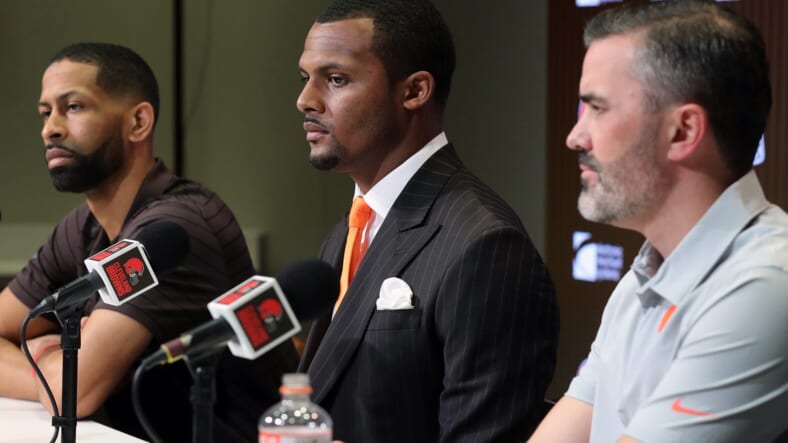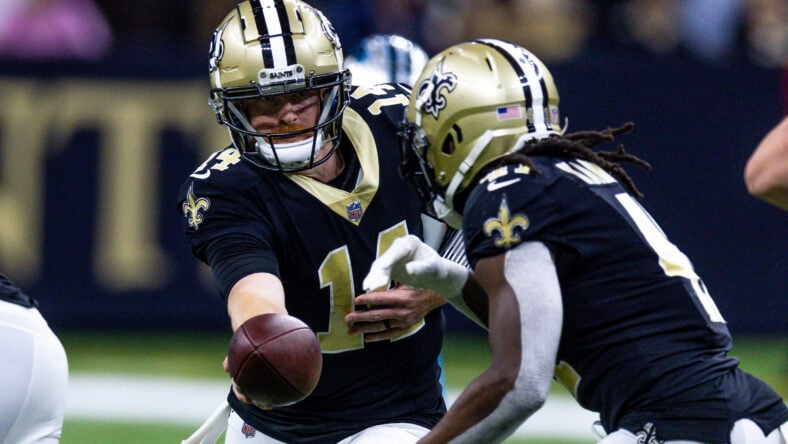The Full Sue Robinson Decision & Summary of Her Reasoning on Deshaun Watson Suspension

Former Judge Sue Robinson issued her decision Monday, suspending Deshaun Watson six games. Here is her reasoning and a summary of her major findings. Her full decision is embedded below.
The Process
Out of more than 60 massages with different therapists, the NFL investigated just twenty-four allegations of sexual misconduct. Of the twenty-four complainants, the NFL only interviewed twelve women. Of the twelve, it relied on the testimony of four women for the arbitration, to support its conclusions. The NFL also presented substantial documentary evidence and interviewed thirty-seven other people. It issued a 215 page investigative report and employed two investigators with decades of experience.
The NFL’s Allegations in Arbitration
The NFL lawyers accused Watson of using “his status as an NFL player as a pretext to engage in a premeditated pattern of predatory behavior toward multiple women,” despite having access to massage therapists through the Houston Texans.
The NFL said Watson had a modus operandi or pattern of conduct which included these steps:
First:
“Mr. Watson identified himself from the outset of each encounter as a quarterback for the NFL via an Instagram inquiry for a massage. Mr. Watson’s requests were typically “urgent,” wanting to schedule a massage that day. He was not looking for a professional setting and often inquired as to whether the massage would be “private.” Mr. Watson admitted that he was not concerned whether the women were experienced massage therapists or even licensed.”
Next:
“Mr. Watson would follow his Instagram contact with texts or calls before each session to make sure that the therapists were comfortable massaging certain areas of his body, particularly his lower back, glutes, abs, and groin area (his “focus points”). Mr. Watson requested that the therapists use a towel to cover his private parts rather than the more typically used sheet. Mr. Watson often provided his own towels, which have been variously described as “medium/small” towels or “Gatorade” towels. Once in the massage sessions, each of the therapists allege that Mr. Watson engaged in what the NFL has characterized as “sexualized behavior.” This behavior includes Mr. Watson’s insistence that the therapists work on his focus points with just a towel as cover. When he turned over on his back, it is alleged that Mr. Watson exposed his erect penis and purposefully contacted the therapists’ hands and arms multiple times with his erect penis. One of the therapists alleges that Mr. Watson not only contacted her arm multiple times, but that he ejaculated on her arm. There is no allegation that Mr. Watson exerted any force against any of the therapists.
The Alleged Personal Conduct Policy Violations
The NFL accused Watson of violating three areas of the personal conduct policy:
(1) sexual assault;
(2) conduct that poses a genuine danger to the safety and well-being of another person; and
(3) conduct that undermines or puts at risk the integrity of the NFL
Robinson’s Gripes With the PCP
Robinson says “sexual assault” is not defined in the NFL personal conduct policy. She deems this to be unfair because it does not give players fair notice of the consequences of pre-outlined behavior.
However, Robinson still adopts the NFL’s definition of “sexual assault,” because, essentially, it is the NFL’s policy.
The NFL’s Definition of Sexual Assault
The NFL defines sexual assault as “unwanted sexual contact with another person.”
The NFL contends that Mr. Watson committed sexual assault by allegedly “touching [his] penis to the women without their consent.”
NFL’s Burden of Proof
The NFL had to prove that it is more likely true than not that:
(1) Mr. Watson intended to cause contact with his penis;
(2) he did so for a sexual purpose; and
(3) he knew that such contact was unwanted.
Robinson’s Findings on Sexual Assault Allegations
Robinson finds that it is not unusual for people to advertise massage services on Instagram or for professional athletes to want areas near their groins massaged for athletic purposes. She also says it is not unusual for therapists to inadvertently touch genitals and men to get erections on occasion during massages.
Watson denied ever getting any erections in the arbitration.
Based on the evidence Robinson found it is more probable than not that Mr. Watson did have erections and that his erect penis contacted the therapists.
Robinson says:
“The therapists’ accounts are substantially corroborated by such evidence as contemporaneous text messages and discussions with third parties after their interactions with Mr. Watson.”
She also said, some therapists who publicly supported Watson also confirmed that they saw him become erect during massage sessions.
Robinson’s Findings on Watson’s Intent
Robinson finds that it is more probable than not that Watson intended the sexual contact and sought out massages for that purpose.
“In this case, Mr. Watson reached out to women whose professional qualifications were unknown and unimportant to him. He insisted on using a towel, increasing the probability of exposure. He insisted on having the therapists focus on areas of his body that not uncommonly triggered erections. And he engaged in this pattern of conduct multiple times. I find this sufficient circumstantial evidence to support the NFL’s contention not only that contact occurred, but that Mr. Watson was aware that contact probably would occur, and that Mr. Watson had a sexual purpose – not just a therapeutic purpose – in making these arrangements with these particular therapists.”
Robinson’s Findings on Whether the Sexual Contact Was Unwanted
Robinson again finds in favor of the NFL, writing:
“I find that the NFL has produced sufficient circumstantial evidence to prove the
last prong of the test, that Mr. Watson knew such sexualized contact was unwanted. Of course,
there is no indication on the record that even experienced therapists “want” such contact, and Mr. Watson certainly did not seek out the most experienced therapists. Moreover, there is credible evidence that one of the therapists expressed her discomfort of the unwanted contact to Mr. Watson during the sessions, and another of the therapists ended the session early.
Given that none of these therapists accepted Mr. Watson’s invitations to engage in further therapy sessions, I find the evidence sufficient to demonstrate that Mr. Watson knew, or should have known, that any contact between his penis and these therapists was unwanted.”
She continues, “To put the point another way, the record demonstrates that Mr. Watson had a reckless disregard for the consequences of his conduct, which I find equivalent to intentional conduct.”
Robinson’s Findings Regarding Whether Sexual Assault Occurred
Robinson finds that Watson did sexually assault four women but that the sexual assault was not violent. She does not examine the other twenty accusers cases because she was limited to only those cases brought before her by the NFL, which were four allegations.
She writes: “I, therefore, find that the NFL has carried its burden to prove, by a preponderance of the evidence, that Mr. Watson engaged in sexual assault (as defined by the NFL) against the four therapists identified in the Report.”
Robinson’s Findings Regarding Whether Watson Posed A Genuine Danger To People
Robinson again found in favor of the NFL and concluded that Watson’s conduct posed a genuine danger to the safety and well-being of the four women.
Robinson takes issue with the fact that the NFL doesn’t define “genuine danger to the safety and well-being of another person” in its policy. She says the NFL defined the term broadly during the arbitration. But she ultimately adopts its definition because, again, it is the NFL’s prerogative to enforce its own policy.
“The NFL asserted that the therapists were “fearful” of Mr. Watson’s ability to “use his status as an NFL player to damage their professional careers.” Further evidence identified by the NFL in support of this offense includes testimony from the four therapists: (1) one of the therapists told the investigators that she sought counseling after her session with Mr. Watson and is struggling to work; (2) another of the therapists reported that she was frustrated, upset, and embarrassed after the session; (3) a third therapist testified that she changed her business practices and suffered from depression and sleeplessness as a result of incident; and (4) the fourth therapist remained uncertain whether she would continue to pursue a career in massage therapy.”
Robinson writes more generally, “I accept the fact that a work environment with sexualized conduct is not a safe environment, and I accept as credible the testimony of these therapists that they felt unsafe and suffered emotional distress as a result of their massage sessions with Mr. Watson.”
Robinson’s Findings Regarding Whether Watson’s Conduct Was Detrimental To The NFL
Robinson finds in favor of the NFL that Watson’s conduct undermines the integrity of the NFL.She finds it reasonable that the NFL expands that definition beyond the Tom Brady case, where it was invoked regarding matters on the field, and also applies it to a player’s private life. She says that is appropriate when that player invokes his status as an NFL player while engaging in prohibited conduct. She believes Watson used his status as an NFL player to do just that.
She writes, “In this regard, the NFL has demonstrated that Mr. Watson identified himself as a player for the NFL to initiate contact with the therapists, and used his ties to the Texans to reinforce his requests for massages focused on his lower back, glutes, abs, and groin area. Having established himself in this context, the NFL has further demonstrated that Mr. Watson engaged in sexualized conduct during the massage sessions. I find this evidence sufficient to demonstrate that Mr. Watson’s conduct undermined the integrity of the NFL in the eyes of the therapists. Mr. Watson’s conduct also has been scrutinized on a national level, as Mr. Watson’s
alleged conduct has been a matter of public record and discourse over an extended period of
time. Regardless of my findings, it is apparent that Mr. Watson acted with a reckless disregard
for the consequences of his actions by exposing himself (and the NFL) to such public scrutiny
and speculation. Mr. Watson’s predatory conduct cast “a negative light on the League and its
players,” sufficient proof that he violated this provision of the Policy.”
The Punishment Desired by the NFL
The league wanted a one-year indefinite suspension and for Watson not to be allowed to be reinstated unless he met certain conditions.
Robinson writes:
“The NFL’s reasoning is reflected in the following testimony of one of its
investigators: “[E]ven with just the four [women], I think we haven’t had someone who over the course of a year-plus time . . . [committed] sexual assault against four different people, and he uses, again, invokes the league in some ways of doing so. That in and of itself is unprecedented.”
Robinson’s Punishment & Reasoning
Robinson finds that Watson’s conduct does not fall into the category of violent sexual conduct that would merit a minimum six game suspension per offense. She compares his case to past discipline of players who were given six games up to ten games but says that in those instances it was for multiple incidents of violent conduct.
She writes:
“by far the most commonly-imposed discipline for domestic or
gendered violence and sexual acts is a 6-game suspension. Only two players have been
suspended for 8 games, one for multiple incidents of domestic violence and the second for the
assault of multiple victims. A single player has been suspended for 10 games, for multiple
incidents of domestic violence for which the player pled guilty to battery.”
She continued,
“It likewise is undisputed that prior cases involving non-violent sexual assault have resulted in discipline far less severe than what the NFL proposes here, with the most severe penalty being a 3-game suspension for a player who had been previously warned about his conduct.”
“There is testimony from one of the investigators that the recommended discipline is warranted because nonviolent sexual assault may cause harmful “after-effects” such as victims “no longer trust[ing] their instincts,”suffering from persistent “humiliat[ion],” and “feel[ing] unsafe to do their jobs.” It was conceded, however, that the
same after-effects would result from acts of domestic violence.”
While Robinson admits, it would be appropriate to discipline players for non-violent sexual conduct, more severely, she doesn’t think it’s appropriate at this juncture because no notice was given under the policy. This is similar to what happened with Ray Rice. Robinson is saying that a minimum six game suspension should be outlined going forward for non-violent sexual contact and defined to place players on notice. She does not believe that such a suspension should be more than six games, without placing a player on notice of what the punishment will be for non violent sexual contact.
While it is debatable whether being ejaculated on or physically touched by a penis is “non-violent,” Robinson says it is an undisputed fact in the context of the arbitration that there was no force. She says the NFL did not allege that there was force. Many states do define assault as physical contact and in some cases, mere threats of contact even without physical touch, whether perceived or verbal but it varies based on the jurisdiction.
Robinson writes:
“The concepts of “unfairness” and “selectivity” demand notice in this case.
Although I have found Mr. Watson to have violated the Policy, I have done so using the NFL’s
post-hoc definitions of the prohibited conduct at issue. Defining prohibited conduct plays a
critical role in the rule of law, enabling people to predict the consequences of their behavior. It is inherently unfair to identify conduct as prohibited only after the conduct has been committed, just as it is inherently unjust to change the penalties for such conduct after the fact.”
Robinson specifically sites the Ray Rice case and points out that a Judge wouldn’t allow the NFL to retroactively impose its new six game minimum suspension on Rice, after it reformed its policy because he did not have prior notice.
Robinson Considers Other Factors In Deciding Discipline Length
“With respect to what the appropriate discipline should be, I note that there are
aggravating factors applicable to Mr. Watson, that is, his lack of expressed remorse and his tardy notice to the NFL of the first-filed lawsuit. As to mitigating factors, he is a first-offender and had an excellent reputation in his community prior to these events. He cooperated in the
investigation and has paid restitution. Although Mr. Watson did not play during the 2021
season, the Commissioner declined to put him on administrative leave under which any games
missed would be credited against any suspension later imposed.”
Robinson’s Conclusion and Recommendations Moving Forward
Robinson calls Watson’s behavior the most “egregious” pattern of conduct in NFL history , investigated by the NFL.
“Mr. Watson is hereby suspended for six (6) regular-season games without pay. Although
this is the most significant punishment ever imposed on an NFL player for allegations of
non-violent sexual conduct, Mr. Watson’s pattern of conduct is more egregious than
any before reviewed by the NFL.”
“Recognizing that the only discipline mentioned in the CBA is a fine or suspension, I
nevertheless believe it appropriate for Mr. Watson to limit his massage therapy to Club directed sessions and Club-approved massage therapists for the duration of his career,
and so impose this mandate as a condition to his reinstatement.”
“Mr. Watson is to have no adverse involvement with law enforcement, and must not
commit any additional violations of the Policy.”
Robinson Claims The PCP Applies to Owners
While there has been no indication that the PCP applies to owners or has been equally applied to owners, Robinson says it theoretically is applicable.
“I note in this regard that the Policy is equally applicable to players and team owners and management. The NFLPA questions whether it is “fair and consistent” to severely punish Mr. Watson for his non-violent sexual conduct and not even charge various team owners who have been accused of similar or worse conduct.”
Robinson’s Full Decision
Categorized:Breaking News LOJ Exclusives NFL The Latest Top Stories



